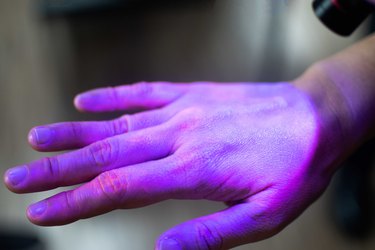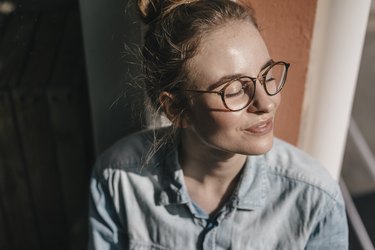
You've probably heard a lot of buzz recently about UV light — including sunlight — and whether or not it can destroy viruses like the novel coronavirus, which causes COVID-19.
It's not all hype. In fact, there's good evidence that UV light in the "C" range, also known as UVC, can kill this particular virus, says Tod Cooperman, MD, president and founder of ConsumerLab.com, a consumer health watchdog group and independent evaluator of dietary supplements.
Video of the Day
Video of the Day
But that doesn't mean you should run out and buy one of the UV boxes or wands that seem to be popping up everywhere. Here's what you need to know.
Get tips on how to stay healthy, safe and sane during the novel coronavirus pandemic.
How UV Light Works
For years, hospitals and labs have used ultraviolet (UV) light to disinfect equipment and surfaces. It works by disrupting germs' genetic material (known as their DNA and RNA). But over the years, research has revealed that out of the three main types of UV light — UVA, UVB and UVC — UVC appears to be the most effective.
More recently, in a September 2020 study in the American Journal of Infection Control, researchers found that UVC light can effectively kill SARS-CoV-2, the virus that causes COVID-19. The study only looked at in vitro efficacy, though, so more research is needed before we can say for sure that it works in the real world.
Another preliminary laboratory study released April 2020 on medRxiv found when pieces of fabric from N95 masks and stainless steel were contaminated with the novel coronavirus and then exposed to a hospital UVC lamp, the virus was killed on both surfaces within an hour. The study is still being reviewed, though, so it shouldn't be taken at face value just yet.
Related Reading
The Problem With Consumer UVC Products
Given this research, you may be thinking seriously about purchasing one of the UVC light products you can find online as a way to disinfect everything from your smartphone to your kitchen counters.
But the FDA issued an advisory against them in February 2020, reminding people that these devices are not yet FDA-approved, and it's unclear how safe and effective they actually are.
"The big challenge with most of them is there's no way to know for sure that they provide a large enough dose of UVC light to the surface you want to disinfect, whether it's a mask, phone or a countertop," Dr. Cooperman explains.
While most products provide their wavelength — which should be at least 222 nanometers (nm), according to the study in the American Journal of Infection Control — most don't provide their irradiance, which tells you how long it will take to kill a coronavirus.
"There's no point in buying a UV wand if it means that you'll have to slowly move it over your phone for an hour," he says. And if the irradiance is high, it can damage your skin and eyes, he notes.
If you do want to give it a try, Dr. Cooperman recommends investing in a UVC box, where you place your phone or other items — like your credit cards, keys or watch — and leave them there for about 10 minutes. (Don't use them on fabric or porous materials such as paper or cardboard, since UV light can cause shadowing on non-solid objects, adds Dr. Cooperman.)
One possibility is the PhoneSoap 3 Smartphone UV Sanitizer ($79.95), which claims to have a UVC wavelength of 254 nm, which is in the correct range to kill coronaviruses.
"It's like using a hair blower to dry an object — it takes a lot of time, and there's no clear way to tell when you're done."
A January 2018 study published in the Journal of the American Association for Laboratory Animal Science found that a similar PhoneSoap device was more effective than a sanitizing wipe like Clorox Bleach Germicidal Wipes or a spray consisting of 70 percent alcohol.
While UVC works fastest and most reliably on non-porous surfaces such as glass, plastic, metal and varnished wood, it's probably easier, faster and safer to clean them with a household disinfectant, Dr. Cooperman says, rather than relying on a UV wand.
"It's like using a hair blower to dry an object — it takes a lot of time, and there's no clear way to tell when you're done," he says of UV light sanitizers.
In addition, you're more likely to be exposed to UVC light this way, which can cause damage to your eyes and skin, according to the National Academies of Sciences, Engineering, and Medicine.

What About Sunlight for Disinfecting?
If UVC products are potentially a waste of time and money, you may wonder if it's better to just duck out and catch some sunshine instead, since sunlight contains UV rays.
But UVC light from the sun is blocked by the Earth's atmosphere, Dr. Cooperman says. When you go outside on a sunny day, the UV light that reaches you is UVA and some UVB, and these types don't destroy coronaviruses quickly.
That being said, there is some budding evidence that sunlight is effective against the novel coronavirus. Preliminary research by the Department of Homeland Security found that simulated sunlight (equivalent to midday sun on a sunny day) evaporated COVID-19 droplets after three minutes on both non-porous surfaces and in the air.
But that doesn't mean you should throw social distancing to the wind this summer: "If you're outside and inhale the droplets from an infected person close to you, you could still get sick," Dr. Cooperman says.
That's one reason why it's thought that high temperatures and UV radiation don't reduce the spread of COVID-19, according to an April 2020 study published in the European Respiratory Journal.
So if you do want to cop some rays, go for it — but put on sunscreen, wear a mask and stay at least six feet away from everyone else around you.
Concerned About COVID-19?
Read more stories to help you navigate the novel coronavirus pandemic:
- Journal of Virology: "Predicted Inactivation of Viruses of Relevance to Biodefense by Solar Radiation"
- Virology: "Far-UVC light efficiently and safely inactivates airborne human coronaviruses."
- medrXiv: "Assessment of N95 respirator decontamination and re-use for SARS-CoV-2"
- Journal of the American Association for Laboratory Animal Science: "Evaluation of 6 Methods for Aerobic Bacterial Sanitization of Smartphones."
- National Academies of Sciences, Engineering, and Medicine: "Does Ultraviolet (UV) light kill the coronavirus?"
- European Respiratory Journal: "No Association of COVID-19 transmission with temperature or UV radiation in Chinese cities"
- American Journal of Infection Control: "Effectiveness of 222-nm ultraviolet light on disinfecting SARS-CoV-2 surface contamination"
Is this an emergency? If you are experiencing serious medical symptoms, please see the National Library of Medicine’s list of signs you need emergency medical attention or call 911.